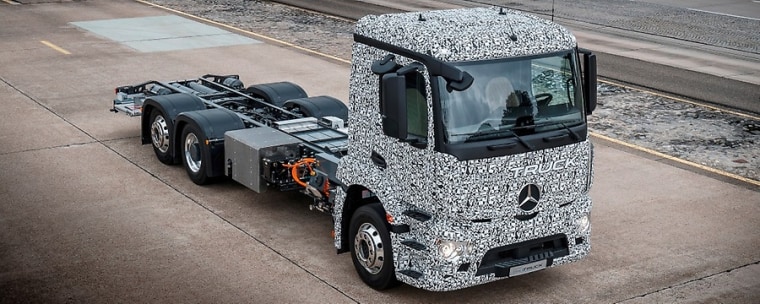While sales numbers remain relatively modest, battery-based vehicles like the plug-in hybrid Chevrolet Volt and the all-battery Nissan Leaf are becoming more and more common fixtures on American roads. But where most makers have been focusing their “electrification” efforts on compacts and even smaller models, we may soon be seeing battery-powered versions of some of the biggest vehicles on the road.
Mercedes-Benz just announced plans to build its first-ever heavy-duty electric truck. The Urban eTruck will be able to handle loads of up to 24 tons and travel as much as 124 miles between charges. The German maker also revealed it is giving serious consideration to a battery-powered version of its big commercial van, the Sprinter, largely for use by “courier” services.

And Mercedes isn’t alone. As part of the “Master Plan, Part Deux” that he revealed last week, Tesla Motors CEO Elon Musk outlined an assortment of new products the California EV maker wants to add to its line-up, including a “new kind of pickup,” a commercial bus, and what he dubbed the “Tesla Semi.” Though details weren’t released, the name suggests it would be in line with the 18-wheelers that haul much of the nation’s freight.
Battery-powered trucks aren’t entirely new. In fact, they were somewhat common in the early days of the auto industry, when there was still a battle underway between gasoline, steam and electric propulsion. And right up until the mid-1980s, battery-powered electric “milk floats” were familiar vehicles for fresh milk deliveries in Great Britain.
Nonetheless, "Electric drive systems previously only saw extremely limited use in trucks," said Wolfgang Bernhard, the head of truck operations for Mercedes’ parent Daimler AG. "Nowadays, costs, performance and charging times develop further so rapidly that now there is a trend reversal in the distribution sector: The time is ripe for the electric truck."
On the automobile side, battery power is still a niche. Add up all the new conventional hybrids, plug-in hybrids and pure battery-electric vehicles and they are expected to account for barely 5 percent of the American market this year, and not much more overseas. But demand is expected to rise, even if fuel prices remain low.
Read More: Volvo is Pushing Down the Pedal on Battery-Powered Cars
That is, in part, due to new government emissions and fuel economy mandates, such as the 54.5 mpg rule that will be phased in here in the U.S. between now and 2025. China is using a carrot-and-stick approach to push electrification in a bid to clean up endemic smog problems, and many European cities may soon ban vehicles not running in zero-emissions mode from their urban cores.
The good news is that battery prices are plunging, and lithium-ion technology is becoming more compact and energy-dense, as well as more reliable.
“The weight of the battery pack, as well as its obvious packaging requirements, has until now stymied the creation of a fully electric heavy-duty truck,” said Tim Urquhart, Principal Analyst at IHS Automotive, in an analysis of the opportunities for electric trucks. “However, the progress that has been made in cell development in terms of increasing power storage and lowering cost means that this concept is now a viable one.”
That means that a number of trucking firms have begun to “pencil” battery power and determined it can be cheaper to operate than a gas or diesel vehicle, especially in urban situations, according to Volker Mornhingweg, the director of van operations for Mercedes.
“I see there is growing demand in the market,” said Mornhinweg, who was in Charleston, SC this past week for the groundbreaking of a new plant that could produce a battery version of the Mercedes Spring plant by early in the new decade, perhaps sooner. “In the near future, I see this demand will rise.”
Mercedes has already been fielding queries from Deutsche Post, and other courier services such as UPS and Federal Express have openly expressed interest in battery vans. The focus would be on shorter routes, such as urban package delivery, where range is less of an issue than for long-haul shipments, and where stop-and-go traffic would allow for regenerative braking.
Read More: Self-Driving Trucks Make Their Way Across Europe
According to United Nations data, more than half of the world’s population lives in cities where electric trucks could make sense, according to IHS analyst Urquhart, and that is projected to grow to 70 percent by 2050.
Exactly how soon Daimler, Tesla, and other makers actually have battery trucks on the road is uncertain, though the odds are that at least some will be rolling within a decade.
